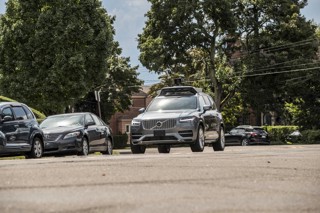The UK Supreme Court has ruled that Uber must classify its drivers as workers rather than self-employed, which could have wider consequences for the gig economy.
The long-running, four-year legal battle concluded today (Friday, February 19), with the court deciding that tens of thousands of drivers at the ride-hailing firm are entitled to the minimum wage and holiday pay.
The GMB Union said it was consulting with Uber driver members over their forthcoming claim, which could leave Uber facing a hefty compensation bill.
Lawyers Leigh Day, fighting the case on behalf of GMB, say tens of thousands of Uber drivers could be entitled to an average of £12,000 each in compensation.
Mick Rix, GMB national officer, said: "This has been a gruelling four-year legal battle for our members – but it’s ended in a historic win.
“The Supreme Court has upheld the decision of three previous courts, backing up what GMB has said all along; Uber drivers are workers and entitled to breaks, holiday pay and minimum wage.
“Uber must now stop wasting time and money pursuing lost legal causes and do what’s right by the drivers who prop up its empire.
“GMB will now consult with our Uber driver members over their forthcoming compensation claim.”
Today’s ruling is the fourth time Uber has lost in court over its treatment of drivers. In October 2016, the Central London Employment Tribunal ruled in GMB's favour. Uber then took its case to the Employment Appeal Tribunal (EAT) in 2017, which also ruled against the ride-sharing company.
In 2018, the Court of Appeal judgement became Uber's third legal defeat on this issue.
It has exhausted all legal avenues now as the Supreme Court, Britain's highest court, has the final say on legal matters.
A key point in the Supreme Court's ruling is that Uber has to consider its drivers "workers" from the time they log on to the app, until they log off.
Uber drivers typically spend time waiting for people to book rides on the app. Previously, the firm had said that if drivers were found to be workers, then it would only count the time during journeys when a passenger is in the car.
In his judgment, Lord Leggatt wrote: “The employment tribunal was, in my view, entitled to conclude that, by logging onto the Uber app in London, a claimant driver came within the definition of a ‘worker’ by entering into a contract with Uber London whereby he undertook to perform driving services for Uber London.”
The Supreme Court reiterated the level of control Uber has over its drivers, including setting fares, not informing drivers of the passenger’s destination until they have been picked up and using the ratings given to drivers by passengers as means of managing performance.
The case will now return to the Employment Tribunal which will decide how much compensation drivers are entitled to.
Lord Leggatt also said that courts should carefully scrutinise working arrangements to ensure that individuals are not denied those rights just because they are called “partners” or “contractors”.
He explained that that the purpose of employment legislation is to protect “workers from being paid too little for the work they do, required to work excessive hours or subjected to other forms of unfair treatment.”
The firm also represents clients from Addison Lee and Stuart in similar workers’ rights claims which are likely to be impacted by this judgment.
An Employment Tribunal in 2017 found that a group of Addison Lee drivers were workers. This was upheld by the Employment Appeal Tribunal in 2018.
A second appeal in the Court of Appeal has been put on hold until a decision has been reached about Uber in the Supreme Court.
In May 2018, a Stuart courier also succeeded in a claim that he was a worker in the Employment Tribunal, with this decision upheld by the Employment Appeal Tribunal in December 2019.
A hearing date in the Court of Appeal has been fixed for October 2021 after a further appeal by Stuart.
Nigel Mackay, a partner in the employment team at Leigh Day, said: “Our clients have been fighting for worker’s rights for many years, so we are delighted that the end is finally in sight.
“Already an employment tribunal, the Employment Appeal Tribunal and the Court of Appeal have ruled that Uber drivers are entitled to workers’ rights, and now the Supreme Court has come to the same conclusion.
“Uber has consistently suggested that the rulings only affect two drivers, but Leigh Day will be claiming compensation on behalf of the thousands of drivers who have joined its claim.
“For many of the drivers that it represents, the claims could be worth thousands of pounds in compensation.”
Mark Cairns, an Uber driver in London for five years, concluded: “It’s been a long time coming but I’m delighted that we’ve finally got the victory we deserve.
“Being an uber driver can be stressful. They can ban you from driving for them at the drop of a hat and there’s no appeal process.
“At the very least, we should have the same rights as any other workers and I’m very glad I’m part of the claim.”























Login to comment
Comments
No comments have been made yet.